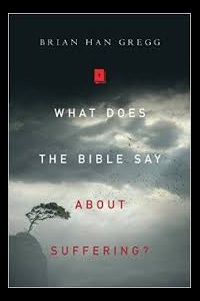What Does the Bible Say About Suffering?
A one-size-fits-all solution to the problem of suffering is neither helpful nor biblical
Suffering is one of the great universals of human life." Brian Han Gregg writes this powerful statement in What Does the Bible Say About Suffering? For the Christian, the experience of suffering poses a difficult theological question: “Why has my God, who is both wholly good and completely powerful, allowed this to unfold?” To answer that question, Gregg turns to the Bible and outlines its response.
Or perhaps I should say responses (plural), for Gregg argues that “there is no single way forward,” as far as the Bible is concerned. Instead, it includes “a number of different responses to the problem of suffering, and we do ourselves and the Bible a great disservice by adopting a one-size-fits-all approach.” He compares the “biblical witness” to a “talented choir” that sings in a “complex harmony.”
“Why has my God, who is both wholly good and completely powerful, allowed this to unfold?”
According to the Bible,
- “[S]uffering may be punishment from God” (e.g., Deuteronomy 30:15–20).
- It may result “from the sinful choices of others” (e.g., Genesis 4:1–8).
- Regardless, “God’s redemptive power is stronger than the suffering that afflicts us” (Genesis 45:4–8).
- Suffering can be “the work of Satan…to cause [us] to fall away from Jesus” (Luke 22:31–34).
- Sometimes, we must humbly accept “the mystery of suffering,” which is beyond our power to comprehend (Job 40:8–14).
- Often, suffering takes place “within the context of God’s redemptive purposes” (Romans 8:18–25).
- Other times, it plays “an important role in our spiritual growth and development” (Hebrews 12:1–13).
- On occasion, God himself uses suffering “to test our faith” (Exodus 17:1–7).
- On other occasions, we experience “the power of God’s new life” only when “we embrace suffering in solidarity with Christ in his death” (2 Corinthians 4:7–12).
- At all times, “God is our comfort in the midst of suffering” (2 Corinthians 1:3–7).
- “We are invited to join [Christ] in emptying ourselves for the sake of others so that we might also share in his glory” (Philippians 2:5–11).
- Our suffering participates in “God’s own suffering as it unfolds in the already and not yet” of the kingdom of God (Colossians 1:24).
When we realize the “complex harmony” of the Bible’s message about suffering, we shy away from simplistic answers about suffering. For example, sin—whether ours or someone else’s—is sometimes the cause of our suffering (answers 1 and 2), but not always (answer 5). The temptation Satan uses to trip us up (answer 4) can be the test God uses to build us up (answer 8). The number of different responses to suffering requires that we use discernment when counseling the sufferer, lest we misdiagnose the cause of their suffering and prescribe the wrong treatment for it.
While these twelve responses differ among themselves, they have this in common: “Each…draws us back to God,” Gregg writes. “Together they encourage us to seek him in the midst of our suffering so that hope may be reborn.
What Does the Bible Says About Suffering? is a short-but-wise book. Pastors will find it useful in their preaching and counseling ministries. Similarly, small groups and book clubs will find that it generates helpful conversations about the church’s response to suffering. I highly recommend it.
 Book Reviewed: Brian Han Gregg, What Does the Bible Say About Suffering? (Downers Grove, IL: IVP Academic, 2016).
Book Reviewed: Brian Han Gregg, What Does the Bible Say About Suffering? (Downers Grove, IL: IVP Academic, 2016).
Influence Magazine & The Healthy Church Network
© 2026 Assemblies of God

